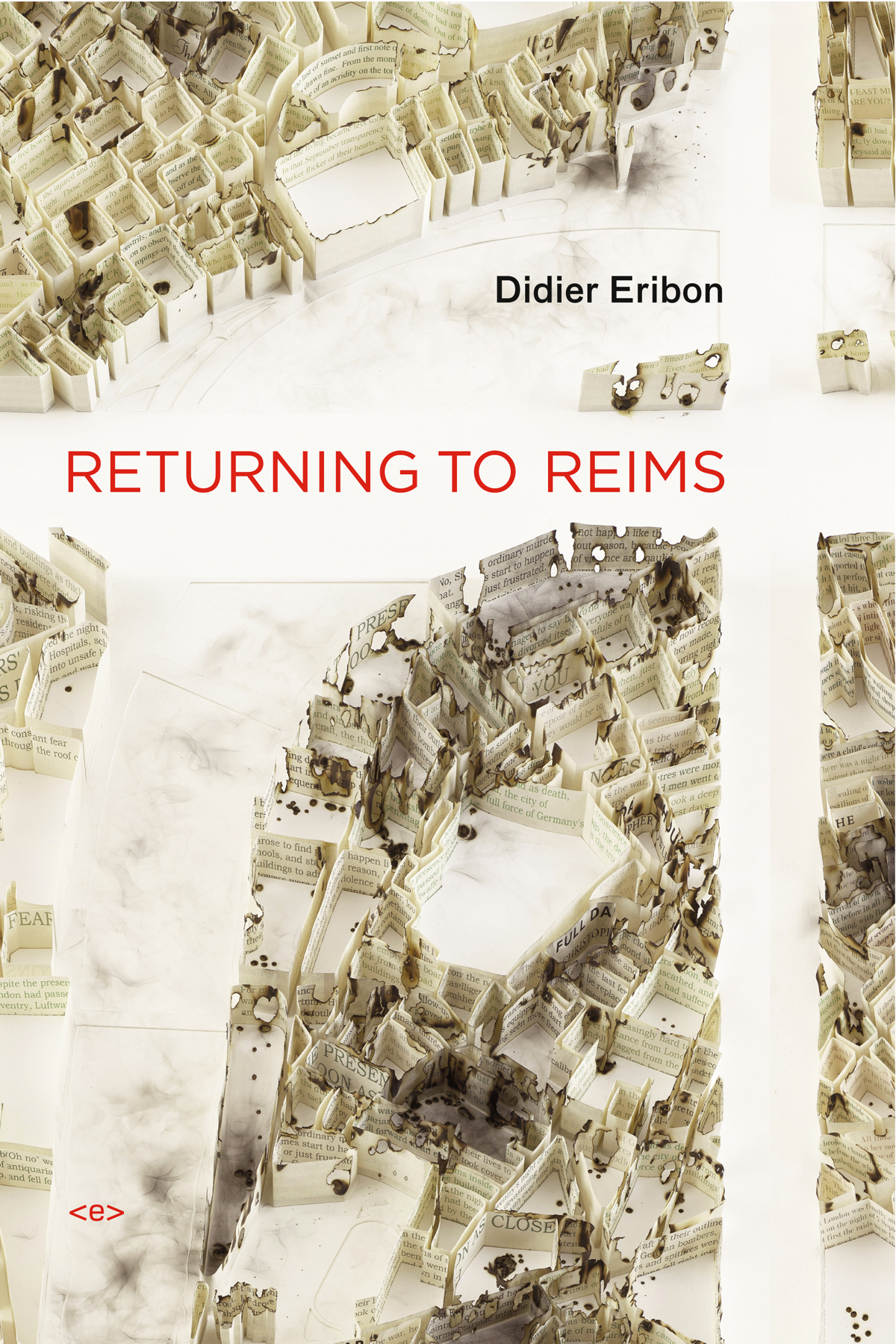 Returning to Reims
Returning to Reims
by Didier Eribon
Semiotext(e). 240 pages, $17.95
IN FRANCE, Didier Eribon is what we would call a “public intellectual” or, less flatteringly, a “talking head,” one of those people who keep appearing on TV to give you their views on some topic of the moment. Eribon is now a professor of sociology at one of the regional French universities that he ridicules in this book. For years before, however, he survived as a public figure largely thanks to the success of his biography of Michel Foucault and articles he wrote for news magazines like Le Nouvel Observateur, a publication that he “hated” and “detested,” to quote this book. “I really didn’t have a choice,” he insists when talking about how he wrote for it for so many years. Evidently, there were no other jobs to be had in France at the time, or at least none that Eribon didn’t regard as even further beneath his dignity. This book is full of such self-justifications.
The first two parts are devoted to explaining how Eribon distanced himself from his family and anything related to his working-class upbringing in the northern French industrial city of Reims. Repeatedly he assures us that he undertook to become this or that, not because it interested him, but because it would make him the polar opposite of what he saw his working-class father or brothers to be. Through comments that he never analyzes, however, we also perceive that Eribon was very much a chameleon, repeatedly transforming himself into a copy of some boy he had a crush on or some man he admired, even when that involved appearing to be or consorting with individuals who were far from the Trotskyite views he espoused with his friends by the time he was an adolescent.
At one point Eribon wonders to himself, “Why have you interiorized to such an extent all the hierarchies of the social world that, intellectually and politically, you claim to be opposed to?” He never pursues that question, however. All he will concede is that “my political convictions didn’t mesh with my attempt to fit into the bourgeois world.” Another time he recalls that his mother once surprised him by praising Emile Zola, the middle-class 19th-century French novelist whose depiction of a coal-miners’ strike in Germinal is both a powerful plea for better working conditions for the poor and a puritanical bourgeois condemnation of the poor as stereotypically dirty, bestial, and oversexed. But this book makes Eribon seem a lot like Zola (without the artistic talent), however much he would prefer to be thought of as another Proust (as he suggests elsewhere).
As I persevered through this book, I wondered who the audience for this translation might be in the U.S. People interested in gay issues, perhaps, a topic on which Eribon writes in France? But I don’t know how many Americans of any sexuality will be able to stomach his unapologetic efforts to be accepted by what was evidently a very classist, snobbish segment of the Parisian intelligentsia. Just as he admits to having insulted other gay people while himself still in the closet because of what he describes as “an irresistible desire to belong to the ‘normal’ world, to avoid paying whatever the cost was of being excluded from that world,” he repeatedly contends that he had “no choice” but to hide his working-class origins in order to be accepted into this world.
Several times he uses the word “miracle” when describing his ability to aspire to a life of the intellect despite his upbringing. This book might have been more interesting had he explained how that miracle came to be. He writes, like a good Marxist theorist, that “only an epistemological break with the way in which individuals spontaneously think about themselves renders possible the description of the mechanisms by which the social order reproduces itself.” If this is true, how was he—unlike, say, other members of his family—able to achieve such a break?
In the same respect, rather than devoting pages to a questionable analysis of the voting patterns of a group he disdains, Eribon might better have devoted a self-analytical chapter or two to analyzing how his adolescent self and his friends could claim to be fighting for the worker while all the while scorning them, a paternalistic mentality that is very much a trait of the French governing classes on the Left. At one point he criticizes French philosopher Pierre Bourdieu for not pushing his self-analysis as far as he should have, but the same can be said of Eribon. Despite George Chauncey’s prefatory claim that this book demonstrates “unflinching honesty,” I often wondered how Eribon could not have seen the negative or hypocritical implications of his self-portrait.
This autobiography comes off rather like the one published in 2010 by France’s gay minister of culture, Frédéric Mitterrand, La Mauvaise Vie (The Bad Life). It left embarrassed readers wondering why Mitterrand would have wanted to present the public with such an unflattering depiction of himself. That is another subject for self-analysis that both Mitterrand and Eribon—unlike their predecessor in French autobiography, Jean-Jacques Rousseau—might have pursued but did not.
________________________________________________________
Richard M. Berrong, professor of French literature at Kent State University, is the author of In Love with a Handsome Sailor.






